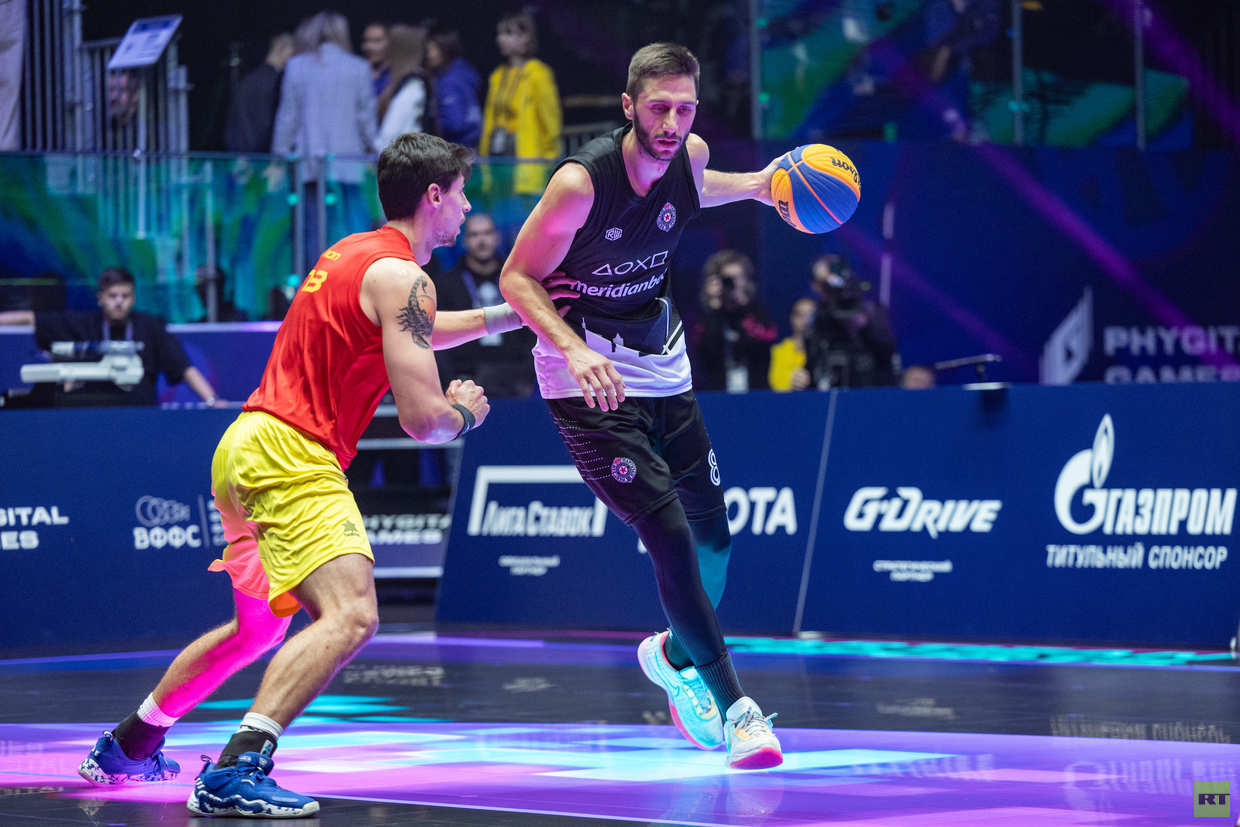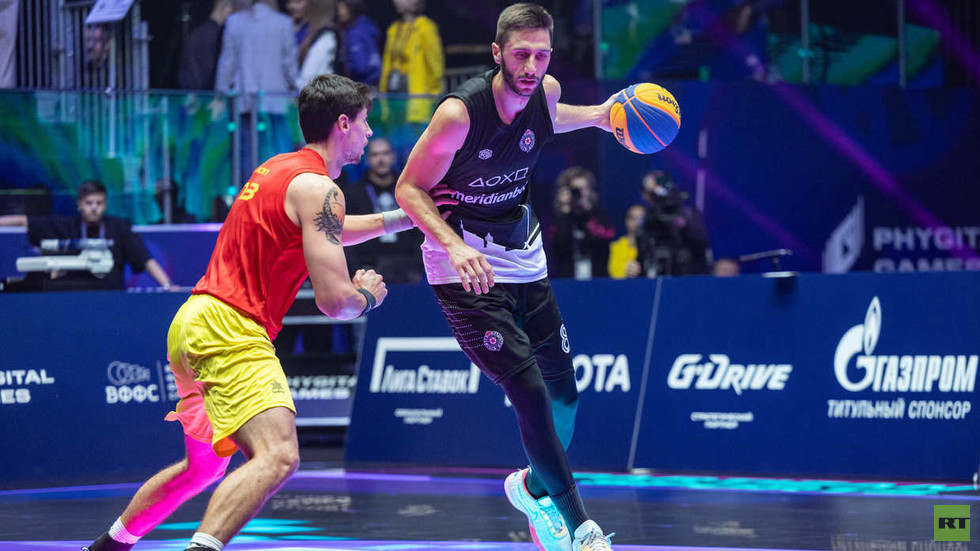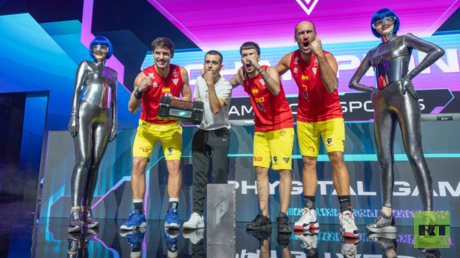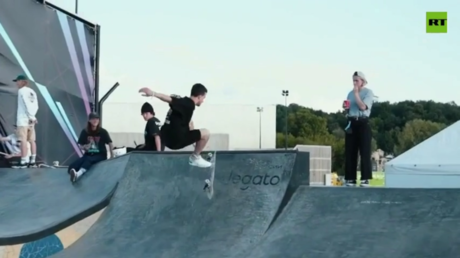
A specially illuminated court, top-notch organization, and a Jordan protégé: What impressed at Phygital Games 10 basketball


Russia's Liga Pro Team and Spain's Ramboot Esports team claimed victory in the Phygital Games 10 basketball tournament held in Kazan as part of the qualifying stage for Games of the Future 2024. The competitions were the largest since the appearance of the discipline, and all participants left with a tremendous impression. Some praised the organization of the tournament, others admired the special lighting on the streetball court, and a number of participants simply rejoiced at the opportunity to visit a beautiful city.
Esports has become a part of everyday life in recent years. Tens of thousands of people are engaged in it, and individual disciplines are no less popular than traditional ones. In Russia, they looked into the future and tried to combine what previously seemed impossible. One of the most striking examples of the symbiosis is phygital basketball, in which athletes first battle on the console, and then sort things out on the court.
The 10th edition of the Phygital Games were perhaps the brightest event in the history of the new sport. The tournament was held at the KazanExpo center, and special LED panels were installed right on the floor of the site so that the action could best resemble a simulation.
“What we see now is very cool. The picture is awesome. It’s a pleasure to perform here… I have participated in many places, but this is the first time I’ve seen something like this,” one of the leaders of the Liga Pro Team, Shalva Shatashvili, said, sharing his impressions.
 Spain beats Serbia in phygital basketball tournament in Kazan, Russia
Spain beats Serbia in phygital basketball tournament in Kazan, Russia
In the ‘Way of a Champion’ phygital basketball tournament, the favorite to win was the St. Petersburg team, which delivered the best of the best. Mikhail Panchenko, a three-time national champion in ebasketball, was responsible for competing in the virtual part, while on the court, Shatashvili, who took the gold in Russia’s 3x3 championship, reigned supreme.
The Liga Pro Team fully justified expectations and qualified for the Games of the Future. In the semifinals, they knocked off Rodina Media, which subsequently took the bronze, and then left U.R. no chance in the decisive confrontation.
“A beautiful tournament, arena, and broadcast. The special lighting on the court was an especially cool idea. When I saw it, I immediately thought: ‘this looks just like a simulator court.' While watching, it seemed to me they were really playing in a computer game… The picture is now the most important thing for any event, and in phygital sports it’s super,” Panchenko said.
Eight teams from Azerbaijan, Belarus, Guatemala, Spain, Kazakhstan, China, Turkey, and Serbia took part in the Phygital Games 10 international tournament. For many, the award was the very fact that they were participating in an event of this level, but not for the main contenders – the Spanish team Ramboot Esports and the Serbian team Partizan E-sports. Professional esports players and real basketball stars were integrated in both teams.
The rest were left to watch the powerful steps of the grandees. In the semifinals, Partizan defeated Alov Basket from Azerbaijan by 13 points. Ramboot also gave MDMX from China a master class, wining 39-17. During the decisive round, the Spaniards demonstrated that they are a little stronger at the moment. In the virtual match, they took a comfortable lead thanks to the amazing play of John Galarza, and then didn’t allow the Serbs to challenge it on the court.
“I want to thank the organizers for inviting me to this wonderful tournament. We not only enjoyed the competition, but also had a great time in a beautiful city,” said Galarza, who played perfectly in all the tournament matches.
In the battle for the bronze, Alov Basket defeated MDMX, but the young Chinese team still has a lot ahead of them. Team leader Jiang Zheng Hui, a professional basketball player, told RT that he and his teammates hadn't made it through the qualifying stages in their own country, but gladly responded to the invitation.
“I can have fun in my free time on the console, but I prefer to hold a ball in my hands, rather than a joystick. And although esports are generally well developed in China, I hope to represent my country directly on the floor. In the meantime, it’s nice to try something new. I’ve watched a lot of different tournaments, but I’ve never seen one like this before. I think phygital games will give serious impetus to the development of this whole trend,” he said.
According to Jia Zheng, the games in Kazan helped him and his teammates gain mastery in a discipline unfamiliar to them, although they tried to offset their lack of experience with diligence.
 Futuristic skateboard games kick off in Russia
Futuristic skateboard games kick off in Russia
“I always try to help my teammates. If they are unsuccessful in the simulator part, I’m obliged to produce on the court. Moreover, all of us in the team are close friends who met six or seven years ago. One guy is actually my classmate from high school,” the athlete added.
At the same time, playing in the 2×2 format was nothing new for him. The athlete believes it differs little from the 3×3 basketball at the Olympics, and the rules are almost identical. There was also a discussion of domestic sports stars and comparisons.
“Of course, Yao Ming is very popular, but we in China also know who Kirilenko is. As a child, I played on a computer simulator, and there was a basketball player like him in it. I remember the commentator calling him an AK-47. But sadly, I’d never heard about Alexey Shved. As for Russian athletes in general, I know that Maria Sharapova screamed very loudly on the court,” the Chinese national said, laughing.
But the basketball player’s main idol remains Michael Jordan, and not Ming. Although Zheng Hui was still very young at the time the legendary Chicago defender was finishing up his career, he still prefers His Airiness to modern NBA stars. Perhaps that’s why he acted in a similar fashion, trying to do the impossible to save his team.
